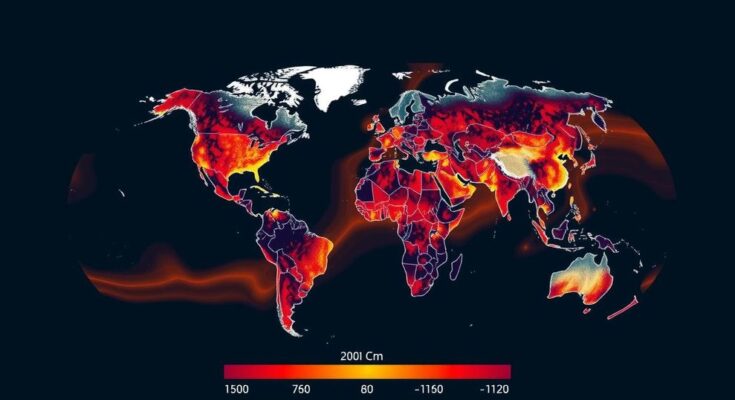The UN’s Emissions Gap report warns that global warming could reach 3.1 C by 2100 without significant reductions in emissions. Current trends indicate a concerning trajectory towards a 2.6-2.8 C increase. Global emissions have hit a record high, and urgent action is required at COP29 for countries to commit to reducing emissions by 42% by 2030 and 57% by 2035 to mitigate climatic impacts.
According to the United Nations’ latest Emissions Gap report, the potential warming of the planet could exceed 3.1 degrees Celsius (5.6 degrees Fahrenheit) by the year 2100 unless nations implement more aggressive measures to reduce greenhouse gas emissions. This alarming forecast surpasses the goals agreed upon under the Paris Agreement for limiting temperature increase to 1.5 degrees Celsius (2.7 degrees Fahrenheit) to mitigate hazardous climate impacts. The report indicates that current climate policies are inadequate, predicting a global temperature rise between 2.6 degrees Celsius (4.7 degrees Fahrenheit) and 2.8 degrees Celsius (5 degrees Fahrenheit) as a possible outcome if existing pledges are maintained. As global emissions have reached a record high of 57.1 gigatonnes of carbon dioxide equivalent—an increase of 1.3% from the previous year—urgency has intensified regarding the upcoming annual United Nations climate summit (COP29) to be hosted in Azerbaijan. The report stresses the need for countries to collectively commit to reducing greenhouse gas emissions by 42% by 2030 and 57% by 2035 to have any hope of adhering to the 1.5 degrees Celsius target. UN Secretary-General António Guterres emphasized, “Either leaders bridge the emissions gap, or we plunge headlong into climate disaster.” Similarly, Inger Andersen, executive director of the United Nations Environment Programme, emphasized the necessity for enhanced action on Nationally Determined Contributions (NDCs). With nations set to convene at COP29, it is imperative that discussions yield concrete commitments to alter current trajectories leading to catastrophic global warming.
The urgency surrounding climate change is underscored in the UN’s annual Emissions Gap report, which evaluates countries’ pledges against scientific requirements to mitigate global warming. The 2015 Paris Agreement established a cap of 1.5 degrees Celsius increase with the aim of preventing severe climatic consequences. As global temperatures have already risen approximately 1.3 degrees Celsius since pre-industrial times, the continuation of current emission trends could lead the planet to unprecedented warming levels. The report reflects on the lack of substantial progress by major emitting nations, particularly in the G20, in meeting their 2030 climate targets. COP29 is positioned as a crucial platform for nations to strengthen their commitments and initiate necessary changes.
The latest UN Emissions Gap report serves as a stark reminder of the insufficient measures currently in place to address climate change, predicting a potential rise in global temperatures that far exceeds international targets aimed at limiting warming to 1.5 degrees Celsius. With record emissions reported, the need for significant action becomes increasingly urgent as nations prepare for pivotal discussions at COP29. To avert a climate crisis, concerted efforts toward ambitious emission reductions are essential. The upcoming summit presents a critical opportunity for countries to establish and commit to more effective climate strategies moving forward.
Original Source: www.theweathernetwork.com




